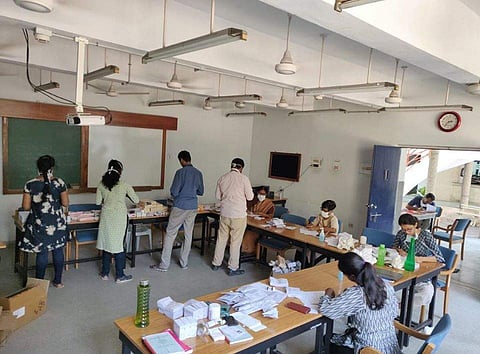

While everyone was scrambling to stock up their refrigerators when the Tamil Nadu government announced the lockdown due to the outbreak of COVID-19. the members of the Community Health Department at Christian Medical College, Vellore were upto something else. The doctors, nurses and health workers all sat down to discuss how to make sure their patients in rural and tribal areas with chronic diseases could get access to their daily medication. And well, they succeeded in doing just that.
"When we were informed that Section 144 was going to be imposed from the next day, the concern among the staff was that patients with chronic diseases such as diabetes, hypertension, seizure disorder and heart disease should not be at risk for complications arising from discontinuation of treatment because of inability to procure medications," Dr Vinod Abraham, Professor and Head of the Department of Community Health said. The health workers then came up with strategies to be carried out in two specific areas where people would have difficulty accessing their medicines.
"Six teams comprising nurses and health workers were rapidly organised to leave early morning on March 24 in order to return before the imposition of Section 144. A total of 28 villages were covered and about 500 patients were given their chronic disease medication for the next one month, "Abraham informed. The team also said that there were 57 villages remaining with approximately 1500 patients with chronic diseases, "The areas will be covered over the next two weeks in a staggered manner to ensure that as many patients as possible will not be forced to discontinue their treatment because of the lockdown. This will also ensure that there no crowding of patients in any location," he added.
The Department has also been training health volunteers from 22 hamlets in the Javadhu Hills. So when it came to distributing material to them during the current scenario, the health workers had some help. "A different strategy was needed in the tribal area in view of the geographic terrain and the wide distribution of hamlets in this area. The department had identified and trained health volunteers from 22 of the hamlets who had been facilitating and enhancing the provision of health and developmental activities in the tribal area over the last 18 months," the doctor told us.
The team then extracted a list of patients and their required medication for the next one to two months from the health information system maintained by the department. "Then a large team of staff from the department packed and labelled medication for each individual patient. This medication was taken up to the tribal area in the hills on a single day and handed over to the health volunteers who will hand over the medication to the respective patients while following the appropriate steps in preventing transmission of infection even during the visits to the different hamlets," he explained.
With complaints of cops beating up people on the roads irrespective of what they're out there for and with transport cut off, residents in rural areas have little to depend on when it comes to acquiring their medication. We can only be thankful, that organisations like CMC are ensuring everyone is safe and sound, not just from COVID-19 but also from chronic ailments that they already have.
